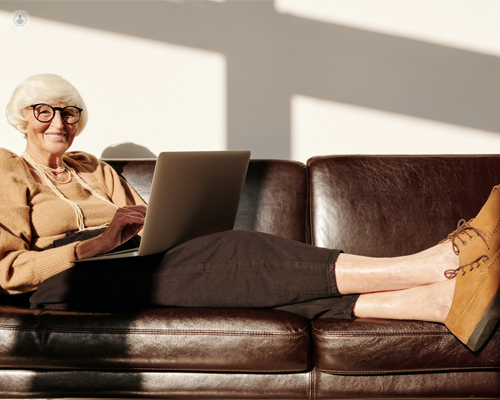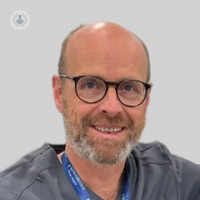Varicose veins: When to see a specialist
Written in association with:Revered consultant vascular surgeon Mr Alastair Lewis shares his expert insight on varicose veins, including the causes, associated risk factors, and symptoms to be aware of. Additionally, the leading specialist explains the value of seeing a specialist about varicose vein concerns, in order to create a personally tailored management or treatment plan.

What are the causes of varicose veins?
For most people, varicose veins have a genetic cause. When you talk to patients, they'll tell you "Yes, my mother and father have varicose veins", or other members of the family do. That's the main cause.
Some of the things then will obviously add to the risk of forming varicose veins, so I see a lot of people who spend large amounts of time on their feet. Generally, people who work in retail; hairdressers, teachers and those kinds of professions.
There are other causes that are more important for certain groups of patients; if you're at risk of varicose veins, then pregnancy will quite often drive, or accelerate the process, and again I see patients who've had two or three pregnancies. They tell me “Each time after delivery, my veins got worse during pregnancy. They shrank a little bit and they never went quite back to where they were."
Those are probably the biggest factors that affect most of the people I see.
What are the symptoms of varicose veins?
For most people, veins don't cause a lot of symptoms. They're really a source of cosmetic concern. For probably about two thirds of people, when you dig down you realise, they are experiencing some of the more common symptoms that occur.
The type of things that people describe to me, are:
- an aching or a heaviness in the legs themselves, or
- even a throbbing in the varicose veins.
This is something that gets worse as the day goes on, and it will be worse on the days where they've been on their feet for great lengths of time. The problem with that group of patients is that those can be quite common symptoms that occur in everybody, even in patients who don't have varicose veins. So, I have to spend a lot of time taking history carefully, assessing the veins and most importantly looking very carefully within ultrasound before I advise the patients on how likely that group of non-specific symptoms are going to resolve after treatment.
There are other symptoms that are very strongly associated with varicose veins. If you're getting itch in the lower part of the leg, particularly just above the ankle, then that's a sign that varicose veins are starting to cause more significant problems. Definitely, at that point, it's a point where I recommend treatment should occur.
For the final group of patients, leg cramps or restless legs do have an association with varicose veins. If you suffer from those, then it's definitely worth getting a venous assessment. If I see significant venous disease, I quite often will recommend a trial of compression. That's a useful way to work out if the leg cramps, night cramps or restless legs are going to have a good response to treatment of any underlying venous disease.
Who is at risk for developing varicose veins?
Anyone who has a family history, or other family members who are affected with varicose veins, are at risk. When you add to that, the situational factors like being on your feet for lengthy periods of time and people who are standing or walking a lot, that will exacerbate that risk factor.
I've already mentioned pregnancy and all the changes that happen in particularly the later stages of pregnancy when blood flow increases throughout the body. Increased pressure in the womb from the growing baby. It really can make quite significant increases in the pressure in the veins of the lower limb. That's the mechanism which pregnancy will exacerbate varicose veins and propagate the veins that might be visible, and quite often become a lot more obvious during the later stages of pregnancy.
How are varicose veins diagnosed?
The most important part of the assessment when you come to the clinic, is the ultrasound assessment. That gives me an opportunity to see where varicose veins are coming from, and that's the most important question I need to ask myself, and then planning treatment. It also informs me in what methods I can use to treat veins.
At the clinical assessment, first of all we'll talk about veins to see which symptoms may or may not be present. Most importantly, we can see what the patient hopes to get out of the treatment for some people. It's a simple cosmetic benefit. For other people there are specific symptoms they're particularly suffering from. For an unfortunate few they've already progressed to the point where skin damage and possible ulceration has occurred. It will take some time to work out what the desired end point of treatment is. I'll assess the veins, first of all, by looking to:
- see where they are;
- what types they are;
- what's happening in the skin around the ankles.
The last part is that detailed ultrasound assessment, and quite often I'll look at the deep veins to make sure they're healthy, and assess the superficial veins very carefully to look for hidden sites of reflux that maybe hadn't been picked up before, or aren't completely obvious with just a clinical assessment.
Then, I'll look at the nature of the main veins that require treatment, considering;
- where they lie;
- what size they are, and;
- what the best treatments are.
That then informs the discussion about how we're going to progress, and what procedures are likely to make the best impact on the complaints and concerns that the patient initially had.
What are the treatment options for varicose veins?
I do all my treatments by keyhole means, so the days of surgery are long gone. It's almost been ten years now since I last did an operation for varicose veins. The first line of treatment for the majority of my patients is laser ablation. This works not on the veins you can see, but on the veins that are the underlying cause of the problem. The roots of the veins.
That's the most effective way; it's a simple procedure that takes about 25 minutes to do, and that replaces the old-fashioned stripping of the veins that people have maybe known from olden days of surgery.
Laser ablation takes about 20, 25 minutes for a vein. It's performed under local anaesthetic and you don't need to be admitted to hospital. You can walk into an outpatient room, have the procedure done while you're wearing your own clothes and walk out afterwards. Doing that laser procedure will bring about a significant improvement in symptoms with veins. And the varicose veins that you can see, will actually, over a period of time, regress and become a lot less obvious. But they'll still be there.
The majority of my patients also want to have their varicose veins treated as well. I treat those with injections with foam sclerotherapy. That works in a similar way to a laser but it's safe to use on veins that are closer to the skin. It's easy to perform on veins that are quite twisty and bendy, as varicose veins often are, that you wouldn't be able to pass a laser fibre through. The injections after they're performed, will kill the veins off and over a few months, the majority of the veins will slowly turn into scar tissue and disappear completely.
What can I do to prevent varicose veins?
Unfortunately, as we've already discussed, varicose veins are a genetic issue. Some people are just unfortunate they're born with a tendency to develop them. If you're one of those people, the only preventative measure that's been proven to work is the use of compression hosiery.
Wearing support stockings and with that, I mean proper medical grade support. That will slow down the progression of venous disease. However, it will still progress. Compression isn't usually pleasant to wear, especially in warmer months. So, what you'll see is that while compliance is quite good in the colder weather, once we get into the spring time then people start wearing them less frequently.
My message to people would be, if you are concerned about the possibility of venous disease or you have varicose veins and you think they're getting worse, is at least get an assessment. I can look with an ultrasound at the underlying veins that might be driving the process, and then give some tailored advice as to how desirable it would be to have something done; whether that needs to be done sooner or is it something you can think about doing in maybe a few years, or further down the line, and finally get some proper advice on good quality, well-fitting compression stockings that will be much more pleasant to wear than the sort of things you can buy off the shelf, or maybe get on prescription from your doctor.
If you're seeking treatment for varicose veins and wish to schedule a consultation with Mr Lewis, visit his Top Doctors profile today.


